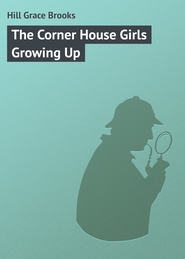По всем вопросам обращайтесь на: info@litportal.ru
(©) 2003-2024.
✖
The Corner House Girls Among the Gypsies
Настройки чтения
Размер шрифта
Высота строк
Поля
“Oh, dear me!” exclaimed Agnes, pushing by the Gypsy. “We can’t stop to have our fortunes told now.”
Ruth kept right on to the car.
“Do not neglect the opportunity of having the good fortune told, young ladies,” said the Gypsy girl shrewdly. “I can see that trouble is feared. The dark young lady goes on a journey because of the threat of ill fortune. Perhaps it is not so bad as it seems.”
Agnes was really impressed. Left to herself she actually would have heeded the Gypsy’s words. But Ruth hurried into the car, Neale reached back and slammed the tonneau door, and they were off for the station with only a few minutes to catch the twelve-fifty train.
“There!” ejaculated Agnes, standing at the curb to wave her hand and look after the car.
“The blonde young lady does not believe the Gypsy can tell her something that will happen – and in the near future?”
“Oh!” exclaimed Agnes. “I don’t know.” And she dragged her gaze from the car and looked doubtfully upon the dark face of the Gypsy girl which was now serious.
The latter said: “Something has sent the dark young lady from home in much haste and anxiety?”
The question was answered of course before it was asked. Any observant person could have seen as much. But Agnes’s interest was attracted and she nodded.
“Had your sister,” the Gypsy girl said, guessing easily enough at the relationship of the two Corner House girls, “not been in such haste, she could have learned something that will change the aspect of the threatened trouble. More news is on the way.”
Agnes was quite startled by this statement. Without explaining further the Gypsy girl glided away, disappearing into Willow Street.
Agnes failed to see, as the Gypsy quite evidently did, the leisurely approach of the telegraph messenger boy with the yellow envelope in his hand and his eyes fixed upon the old Corner House.
Agnes ran within quickly. She was more than a little impressed by the Gypsy girl’s words, and a few minutes later when the front doorbell rang and she took in the second telegram addressed to Ruth, she was pretty well converted to fortune telling as an exact science.
Sammy Pinkney had marched out of the house late at night, as his mother suspected, lugging his heavy extension-bag, with a more vague idea of his immediate destination than was even usual when he set forth on such escapades.
To “run away” seemed to Sammy the only thing for a boy to do when home life and restrictions became in his opinion unbearable. It might be questioned by stern disciplinarians if Mr. and Mrs. Pinkney had properly punished Sammy after he had run away the first few times, the boy would not have been cured of his wanderlust.
Fortunately, although Sammy’s father was stern enough, he very well knew that this desire for wandering could not be beaten out of the boy. Merely if he were beaten, when he grew big enough to fend for himself in the world, he would leave home and never return rather than face corporal punishment.
“I was just such a kid when I was his age,” admitted Mr. Pinkney. “My father licked me for running away, so finally I ran away when I was fourteen, and stayed away. Sammy has less reason for leaving home than I had, and he’ll get over his foolishness, get a better education than I obtained, and be a better man, I hope, in the end. It’s in the Pinkney blood to rove.”
This, of course, while perhaps being satisfactory to a man, did not at all calm Sammy’s mother. She expected the very worst to happen to her son every time he disappeared; and as has been shown on this occasion, the boy’s absence stirred the community to its very dregs.
Had Mrs. Pinkney known that after tramping as far as the outskirts of the town, and almost dropping from exhaustion, Sammy had gone to bed on a pile of straw in an empty cow stable, she would have been even more troubled than she was.
Sammy, however, came to no harm. He slept so soundly in fact on the rude couch that it was mid-forenoon before he awoke – stiff, sore in muscles, clamorously hungry, and in a frame of mind to go immediately home and beg for breakfast.
He had more money tied up in his handkerchief, however, than he had ever possessed before when he had run away. There was a store in sight at the roadside not far ahead. He hid his bag in the bushes and bought crackers, ham, cheese, and a big bottle of sarsaparilla, and so made a hearty if not judicious breakfast and lunch.










